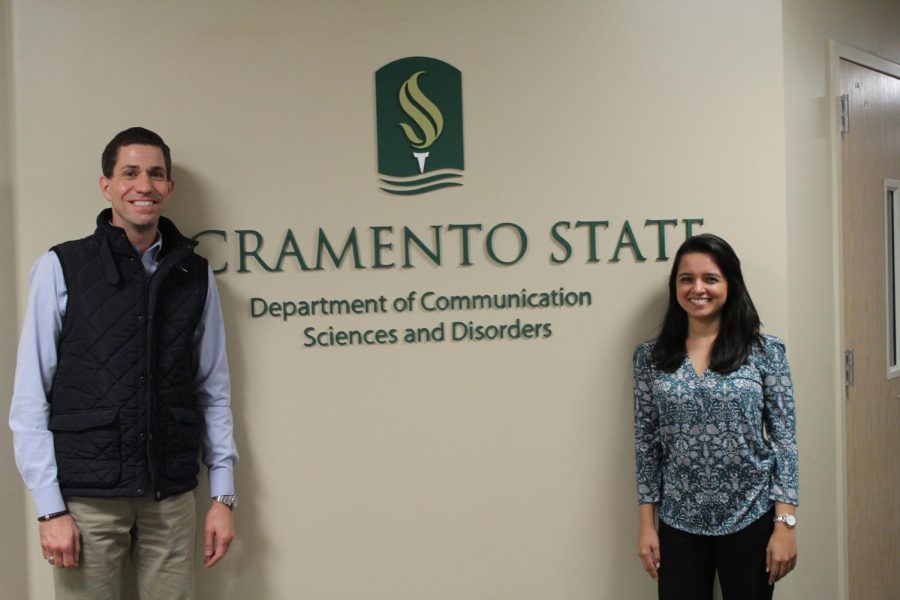Sac State welcomes new doctoral program in audiology
The Doctor of Audiology degree will become one of three university doctoral programs
Nicholas Corey – The State Hornet
Department Chair of Communication Sciences and Disorders, Robert Pieretti and Laura Gaeta, Doctorate of Audiology director, pose in front of the entryway to their department’s office on Jan. 31. The program is available for enrollment by fall 2020.
February 16, 2019
The Doctor of Audiology degree will be the third doctoral program available at Sacramento State and the second from the College of Health and Human Services.
Sac State is one of four CSUs to receive approval of the proposed doctorate of audiology degree along with San Jose, Northridge and Los Angeles.
Laura Gaeta, the Au.D program director and Robert Pieretti, chair of the communication sciences and disorders department, attributed the start of the doctorate degree at Sac State to a bill passed by California Legislation in 2016.
Assembly Bill No. 2317 allows CSUs to award the Au.D degree, in collaboration with University of California or as independent programs for California colleges and universities.
Sac State provided a master’s degree in audiology for 40 years before the program ended in 2007. Due to a licensing change, a master’s is no longer the minimum to become an audiologist, forcing the program to close.
According to Gaeta, an audiologist is able to identify, prevent, and diagnose hearing loss, assess the auditory system, work on rehabilitation of hearing, and diagnose vestibular disorder, which affects the inner ear and balance.
In Spring 2018, Sac State approved the curriculum and the proposed program.
Last fall, the Western Association of Schools and Colleges Senior College and University Commission (WSCUC) granted approval of the proposed Au.D program. The program also received approval from the Accreditation Commission for Audiology Education (ACAE) which granted Sac State developing status. This allows Sac State to be able to hire faculty and begin enrolling students.
Gaeta and Pieretti said that Sac State is currently seeking approval from the CSU Chancellor’s office and accreditation from the American Speech-Language-Hearing Association.
“Dr. Gaeta has done a fantastic job because she’s been here for just 12 months – the program director really is looking at how this program needs to develop and how it will move forth from that point and so she’s done that,” Pieretti said.
Gaeta’s responsibilities include program development, creating syllabi, establishing agreements for clinical placements, and completing applications for accreditation.
According to Pieretti, students are not required to have a bachelor’s degree in communication sciences and disorders to be eligible to apply for the program.
“The master’s degree is the entry level for speech-language pathologists, and so those students that do the undergraduate program, that is the starting point for getting into a master’s program,” he said.
“The undergraduate degree, they’re both the same. Speech pathology or audiology, it’s the same undergraduate degree, it’s only at the graduate level where you would go into either speech-language pathology or audiology, ” said Gaeta.
Communication science and disorders major and current undergraduate student, Caroline Steele, said she plans on applying to a graduate program with a desire to study audiology next year.
“I want to make a difference in deaf culture and to those who live with hearing problems in my surrounding area,” Steele said.
Students who enroll in the doctoral program can anticipate an 11-semester program that occurs during fall, spring, and summer. This includes at least four semester-long internships and a year-long externship.
Pending final approval, the program will commence in fall 2020.
Correction: Feb. 26, 2019
An earlier version of this article misstated that the Doctor of Audiology had already been accredited, when in fact, it is still waiting for accreditation. The article also misidentified the Speech-Language-Hearing Association as the “American Speech and Language Association” and the Western Association of Schools and Colleges Senior College and University Commission as the “Western Association for College Admission.”
































































































































